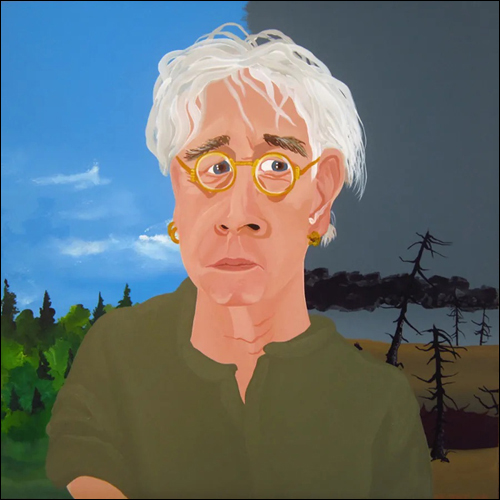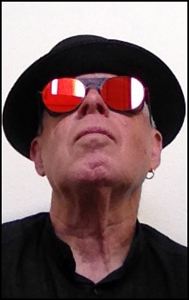By Karen Bliss
Singer, songwriter, and guitarist Bruce Cockburn—inducted into the Canadian Songwriters Hall of Fame in 2017—has written hundreds of songs spanning 27 studio albums over a 50-plus year career, amassing 22 gold and platinum records, including 6x platinum for his 1993 Christmas album. His self-titled debut album came out in 1970, on the label his long-time manager Bernie Finkelstein’s created, True North Records.
An outspoken political activist and humanitarian with a firm stance against warmongering and environmental decay, the Ottawa native is known for such hits as “Wondering Where the Lions Are,” “Lovers in a Dangerous Time,” and “If a Tree Falls.” Still writing songs that are relevant and true, at 78-years-old he is still a workhorse. Last year, he dropped the stellar album, O Sun O Moon—produced by Colin Linden—and has since been touring extensively in Canada, the U.S. and overseas.
In between show dates, he will pick up another Honorary Doctorate of Music Degree on June 14 from Wilfrid Laurier University in Waterloo, Ontario, and on July 7 will be inducted into Mariposa Hall of Fame during the folk music festival in Orillia.
He has already been inducted into Canada’s top halls: the aforementioned CSHF, the Canadian Music Hall of Fame (aired during the JUNO Awards) and Canada’s Walk of Fame. He was invested as a Member of the Order of Canada in 1983 and promoted to Officer of the Order of Canada in 2003. Later in 1998, he was presented with the Governor General’s Performing Arts Award. Bruce has also earned 13 JUNO Awards, the Allan Slaight Humanitarian Spirit Award, and the Queen Elizabeth II Diamond Jubilee Medal. He was even featured on a postage stamp in 2011.
Cockburn, who lives in San Francisco, talked with the CSHF during his recent U.S. leg. He starts a run of Canadian dates on May 24.
You have toured everywhere. When you put together a tour these days, do you try to include places you’ve never been or space them out so you can visit a museum or a place you enjoy?
[laughs]. It’s not very romantic. Basically, Bernie calls the booking. Where can we do it that’s practical and that we haven’t been to most recently? That’s the main concern when you’re looking at a geographical area. Sometimes, it comes out of a promoter making an offer somewhere, like if we got a good offer to play a festival in England, then we would try to find other shows in England to put around it. But, for touring around North America, right now we’re booking for next March and putting on a tour on the West Coast.
What do you remember most fondly about the Canadian Songwriters Hall of Fame induction, the same year as Neil Young, at Massey Hall?
I remember most of it. I think William Prince and Elisapie doing “Stolen Land” was a wonderful thing. Buffy Sainte-Marie’s introduction of me was fantastic. I was so touched by that. She just said great stuff. It was smart and right on the money, as far as I was concerned. So, that’s what I remember most.
And I also remember being slightly shocked by the fact that Neil came with Daryl Hannah, his current partner. I had met Daryl back in the ’80s when she and Jackson Browne were together. I went to an event at their house in L.A. Daryl Hannah, all these years later looked exactly the same as she did when I met her the first time, which was like, “How did you do that?” You know, we know how it gets done by some people [laughs].
She has very good genes, that’s for sure.
Having seen her in the movies, like Kill Bill, where she actually does look older in those movies. But there at Massey Hall, she looked exactly the same as when she answered the door when I went to their house. And, it was kind of like, “What are you, a vampire?” But Neil, of course, I don’t know him well, but we’ve been acquainted for a long, long time and he and I both look our ages. But Daryl didn’t. Those are memorable moments.
You said something at the induction about your long-time manager Bernie: “In a world increasingly defined by its fakery, we together have pulled off the greatest trick ever—we spread truth.” Do you remember writing that in your speech?
Yeah, vaguely, yeah.
Do you remember what you meant by that? The “we spread truth” part?
Bernie’s a businessman; I’m an artist and the relationship we have is symbiotic. Bernie still manages me because he loves the music. And he’s proud of it. I do it because I love the music. I like getting paid, of course. But I don’t do it for the money. I’d be doing it if I weren’t getting paid.
Okay, it sounds a little grandiose, put it this way: I want my songs to be truthful. That doesn’t mean they can’t be fictional. It’s the same way you can put truth in a novel.
You can put truth in any kind of song, but they need to have an emotional truth. And, when facts are cited, like I said, it can be distorted in a fictionalized way, but, in general, I’m trying to tell some kind of truth. I’m trying to tell my spiritual truth, trying to leave a record of my journey through life that may be of use to someone, or may not, but if I don’t put it out there, it won’t be of use to anybody.
So that’s why I do this. And, to me, it’s all about truth in the biggest sense with a capital “T.” I might exaggerate something or diminish something else, for the benefit of making a song entertaining and interesting, but it has to come from a real place inside me. And that’s what I have to share. Without that, there’d be no point in doing it. Without that, I would be doing it for the money. And so that’s why I called it “truth.”
Working with Bernie this long, that is rare in business. Is there something you can point to that has been the key to how you have been able to work together all these years, through all life’s ups and downs?
Well, I think the point one is it’s always worked. So, why mess was a good thing? But, also, like any relationship, it’s required patience and tolerance and forbearance, on both our parts, and the ability to step back the frustrations that come with dealing with anybody over time. So far, we’ve been able to do that. We’ll probably be able to continue.
Would you consider selling your catalogue the way a lot of your peers have been doing? Gives you cash in the bank and songs are complicated for your estate, your family.
I did do that. When I became a legal resident of the U.S., for tax reasons, it didn’t make sense. The advice I got from my accountant was don’t own a corporation in Canada and live in the United States. So I sold it. That’s going back now at least 12 years.
You were ahead of what’s turned into a trend with legacy songwriters. Neil, Dylan, Springsteen, so many.
Those guys are doing it because they get so much money. And yes, it simplifies their estate dealings, I guess. But, for me, it was a practical decision that I would have preferred not to do, actually, because I like the idea of having control over what happens to the songs. But, at the same time, and it’s not a total picture, because I have a publishing company that owns the songs that I’ve written since a deal was made.
So, there’ll still be those considerations when I croak, family will have to deal with, but you can’t avoid it anyway unless your economic life is so simple. But, for most of us, it isn’t because of the tax department [laughs]. It’s always complicated. There’s always stuff like that to deal with that you have to try to head off. I mean, we think about that stuff and have tried to make plans that won’t be too difficult to deal with.
As an activist and largely a socio-political songwriter, we have seen young people protesting for tighter gun control, women’s rights, and recently setting up pro-Palestinian encampments at universities, and yet popular music, the songs topping the charts, doesn’t reflect that. Do you think young people’s interest in substantive issues might start seeping into music?
I don’t have much of a sense of what college-age people are listening to. But we’ve seen all this before. In the ’60s, when the Vietnam War was on, especially in the States—there were protests in Canada, too, not necessarily against the war, it was just a thing that people did in fashion, in a way, to have these kinds of events. I’m not trying to diminish the seriousness of it by calling it a fashion, but these things kind of seem to go in waves or phases. And back then, people were killed at demonstrations because they called out the troops, and the troops did what troops do. This is that pendulum swinging back that way again, with different kinds of provocation and different circumstances and slightly different cause, although not radically different, but still the result of U.S. involvement in other people’s affairs.
It will be interesting to see if that starts getting reflected in music.
I think it will. I mean, it’s always been there in rap music. Rap music is hugely popular. Not all rappers do it, but lots of them do take on issues in their music in their material.
So, even if it’s passing references, along with the boasting and whatever else, there’s frequently commentary on whatever’s going on around them. That’s basically what we’re talking about with respect to the demonstrations. So, I’ve got a feeling that it will show up, that we’ll probably see more of it before it’s over.
At this point, it’s hard to know how people respond. I’m not in touch with that. If I were to be a songwriter now, starting out, I’d probably be sitting in my bedroom, looking at my computer and figuring out what to do with that and writing songs.









